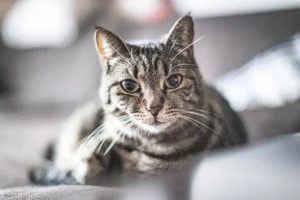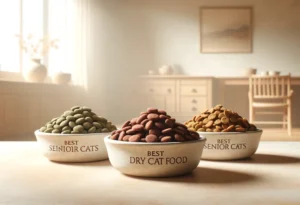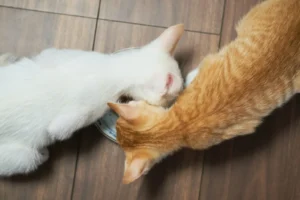Old cats getting skinny can be a cause for concern for many pet owners. Understanding why this happens is crucial in keeping our senior feline friends healthy and happy. So, why do old cats get skinny?
Old cats getting skinny is a common issue that many pet owners face, but there are specific reasons behind this phenomenon. Let’s explore the possible reasons and solutions for why your aging kitty might be losing weight.
Metabolic Changes
As cats age, their metabolism naturally slows down. This decreased metabolic rate can result in weight loss, as their bodies struggle to maintain muscle mass and store fat. To help address this issue, increase the protein content in your senior cat’s diet. Protein is essential for muscle maintenance and can help prevent further weight loss. Additionally, consider smaller, more frequent meals to ensure your cat is getting enough nutrients throughout the day. If weight loss persists, consult your veterinarian for a tailored nutrition plan to support your cat’s changing metabolic needs.
Dental Problems
Dental problems are common in older cats and can significantly impact their ability to eat. If your cat is experiencing dental issues, such as loose or missing teeth, gum disease, or oral tumors, they may avoid eating due to pain. This can lead to weight loss over time. To help your cat maintain a healthy weight, consider softening their food with water or switching to a wet diet that is easier for them to chew. Regular dental check-ups and cleanings are also crucial to prevent dental issues and ensure your senior cat can eat comfortably. Remember, a healthy mouth leads to a happy, well-fed cat.
Additional Unique Insight: Cats are masters at hiding pain, so it’s essential to observe their eating habits closely. If you notice any changes in their appetite or difficulty chewing, it could be a sign of underlying dental problems contributing to weight loss.
Remember, addressing the root cause of weight loss in old cats, whether it be metabolic changes or dental issues, is vital to ensuring their health and well-being in their golden years. By making simple adjustments to their diet and providing proper dental care, you can help your older feline friend stay fit and happy for years to come.
Muscle Mass Loss
As cats age, they may experience muscle mass loss. This can be due to a variety of factors, including a decrease in physical activity, changes in metabolism, and hormonal imbalances. The loss of muscle mass can lead to a decrease in weight, making older cats appear skinny. To help combat this, ensure your senior cat has access to a balanced diet rich in protein to support muscle maintenance.
Health Conditions
Several health conditions can contribute to weight loss in older cats. Hyperthyroidism is a common condition in elderly felines that can cause a significant increase in metabolism, leading to weight loss despite a ravenous appetite. Kidney disease is another prevalent issue that can affect older cats, causing a decline in appetite and weight loss. Regular veterinary check-ups can help detect these conditions early on and provide appropriate treatment to help your cat maintain a healthy weight.
- Dental problems: Dental issues such as tooth decay or gingivitis can make eating uncomfortable for older cats, leading to a decrease in food intake and subsequent weight loss.
- Arthritis: Arthritis can impact an older cat’s mobility, making it difficult for them to access their food or move around comfortably, resulting in weight loss. Providing easy-to-reach feeding stations and comfortable bedding can help alleviate this issue for your senior feline friend.
Remember, addressing the underlying health conditions and making adjustments to your cat’s diet and environment can help prevent excessive weight loss in older cats. Be observant of any changes in your cat’s weight and behavior, and consult your veterinarian if you have concerns about their health.
Dietary Needs
As cats age, their bodies undergo changes that can affect their dietary needs. Metabolism slows down, leading to decreased calorie requirements. Additionally, dental issues may make it painful for older cats to eat regular dry food, causing them to avoid meals and potentially lose weight.
To help prevent weight loss in old cats, consider switching to wet food. Wet food is easier to chew and digest, making it more appealing for senior felines. Look for high-protein options tailored for older cats to support their muscle mass.
Increasing the number of meals throughout the day can also help ensure your old cat is getting enough nutrition. Smaller, more frequent meals can be easier on their digestive system and prevent them from feeling too full at once.
Lastly, consult your veterinarian to discuss the best diet plan for your aging cat. They may recommend supplements to support joint health or specialized diets for medical conditions that could be contributing to weight loss.
Exercise Importance
Exercise is not just for young, spry kitties—it’s essential for senior cats too. Regular physical activity is crucial for maintaining muscle mass, joint flexibility, and overall health in aging felines. Lack of exercise can contribute to weight loss and muscle weakness in old cats.
Encourage your senior cat to stay active by incorporating toys, scratching posts, and interactive play into their daily routine. Cat trees can also provide opportunities for climbing and jumping, helping to keep your aging furball physically engaged.
In addition to playtime, consider gentle exercises such as low-impact walks or short indoor agility courses to keep your older cat moving and stimulated. These activities can help prevent muscle atrophy and keep your senior kitty feeling spry.
Remember, it’s essential to adjust the intensity and duration of exercise to suit your cat’s age and physical condition. Always monitor your senior cat during activity and stop if they show signs of exhaustion or discomfort. And of course, consult your veterinarian before starting any new exercise routine to ensure it’s safe for your aging feline friend.
For more information on creating a safe and engaging exercise routine for your senior cat, check out this helpful resource from the American Association of Feline Practitioners: Feline Exercise Tips.
Regular Vet Check-ups
Regular vet check-ups are crucial for older cats to catch any potential health issues early and prevent weight loss. As cats age, they become more susceptible to various health problems that can lead to weight loss, such as hyperthyroidism or kidney disease. By detecting these issues early, your vet can provide the necessary treatment to help your senior cat maintain a healthy weight. Scheduling regular check-ups can also help monitor your cat’s overall health and ensure they are receiving the proper care they need in their golden years.
Fun Facts about Senior Cats
Did you know that senior cats tend to sleep more than younger cats? As cats age, they often become less active and require more rest to conserve their energy. Additionally, older cats may experience dental issues that can contribute to weight loss, making it essential to provide them with soft food or dental treats to help maintain their weight. Another interesting fact is that senior cats may groom themselves less, leading to a dull coat, which can be a sign of underlying health issues. Regular grooming and vet check-ups can help address these issues and keep your senior feline happy and healthy.
- Older cats may experience a decrease in muscle mass, which can make them appear thinner. Providing them with high-quality protein in their diet can help maintain their muscle mass and prevent excessive weight loss.
- Senior cats may develop arthritis, which can make it painful for them to move around and eat. Ensure your cat has easy access to their food and litter box to make it easier for them to navigate their environment.
Alex, a passionate animal lover, has experience in training and understanding animal behavior. As a proud pet parent to two dogs and three cats, he founded AnimalReport.net to share insights from animal experts and expand his knowledge of the animal kingdom.




